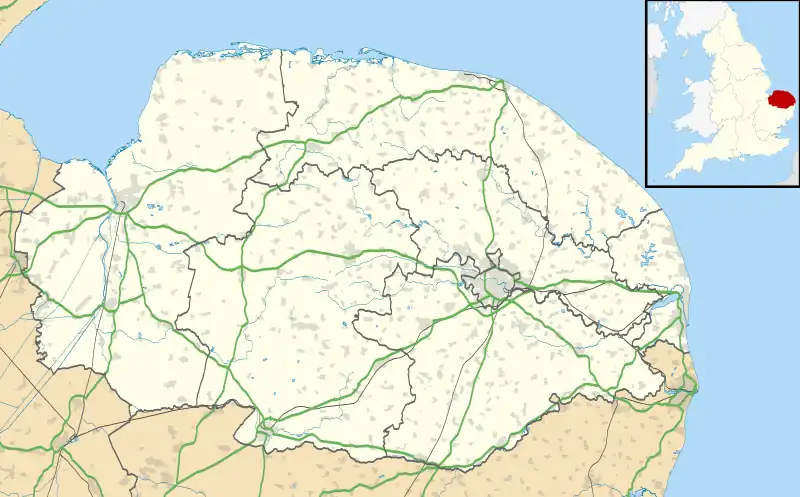| Great Witchingham | |
|---|---|
 St Mary's Church, Great Witchingham | |
 Great Witchingham Location within Norfolk | |
| Area | 9.12 km2 (3.52 sq mi) |
| Population | 496 (2011)[1] |
| • Density | 54/km2 (140/sq mi) |
| OS grid reference | TG100193 |
| Civil parish |
|
| District | |
| Shire county | |
| Region | |
| Country | England |
| Sovereign state | United Kingdom |
| Post town | NORWICH |
| Postcode district | NR9 |
| Police | Norfolk |
| Fire | Norfolk |
| Ambulance | East of England |
Great Witchingham is a village and civil parish in the English county of Norfolk about 11 miles (18 km) north-west of Norwich.
It covers an area of 9.12 km2 (3.52 sq mi) and had a population of 564 in 235 households at the 2001 census,[2] including Lenwade but reducing to a population of 496 in 219 households at the 2011 Census. For the purposes of local government, it falls within the district of Broadland. Great Witchingham parish contains the hamlet of Lenwade.
The parish church of St Mary is a Grade I listed building dating from the 14th century.[3]
The Norfolk Wildlife Centre and Country Park, a local attraction also known as the Animal Ark, is in Fakenham Road.[4]
Old Witchingham Hall, built in the 16th century, was demolished in the 1980s. It was once the home of John Norris (1734–77), High Sheriff of Norfolk for 1766.
The village is also home to Great Witchingham Cricket Club, who play in the East Anglian Premier League.
Great Witchingham Hall
_optimized_and_spun.jpg.webp)
Great Witchingham Hall is a Grade II* listed country house built in the 16th or 17th century but extensively remodelled in the 19th century. It is built in two and three storeys of red brick with stone and plastered brick dressings and a steeply pitched slate roof. The Hall was owned and occupied by country squire Oliver Le Neve between 1678 and 1711. Le Neve is significant for his 1698 mortal duel with Sir Henry Hobart of Blickling Hall, the last duel fought in Norfolk.[5] The south wing was added in 1812 by Timothy Tompson and the north frontage redesigned in 1872 for Charles Kett Tompson, High Sheriff of Norfolk for 1827.[6] After the latter's death it passed to his son-in-law, Viscount Canterbury. It later became the seat of William James Barry J.P. (1864–1952), High Sheriff of Norfolk for 1912, and his son Lieutenant-Colonel Gerald Barry (1896–1977). The dilapidated post-WW2 property was bought in 1950 by Bernard Matthews, and after being initially used for turkey rearing and processing, became the head office of his turkey business, Bernard Matthews Farms.[7]
The GWR 6959 Modified Hall Class No.6966 was named Witchingham Hall. Out shopped from Swindon Works on 31 May 1944 as part of Lot No.350, she was initially allocated to 82D Westbury, and finally to 81F Oxford. Withdrawn on 30 September 1964, she was sold by British Railways to Birds scrap metal merchants of Risca, Newport, South Wales and disposed of on 28 February 1965.[8]
Notes
- ↑ "Civil Parish population 2011". National Statistics. Office for National Statistics. Retrieved 7 August 2016.
- ↑ Census population and household counts for unparished urban areas and all parishes. Office for National Statistics & Norfolk County Council (2001). Retrieved 20 June 2009.
- ↑ Historic England. "Church of St Mary (Grade I) (1076900)". National Heritage List for England. Retrieved 6 January 2015.
- ↑ Animal Ark Archived 2013-10-29 at the Wayback Machine Retrieved 25 October 2013
- ↑ Nicolson, Adam (2012); Gentry: Six Hundred Years of a Peculiarly English Class, Part III: The Great Century 1610-1710, "Honour: The le Neves, Great Witchingham, Norfolk", HarperCollins. ISBN 0007335504
- ↑ Historic England. "Great Witchingham Hall (Grade II*) (1076861)". National Heritage List for England. Retrieved 6 January 2014.
- ↑ Bernard Matthews Contact Page Archived 2012-03-05 at the Wayback Machine
- ↑ "Rail UK British Railway Steam Locomotive".
External links
![]() Media related to Great Witchingham at Wikimedia Commons
Media related to Great Witchingham at Wikimedia Commons
- gwvh.org.uk - Great Witchingham Village Hall Project
- GWPC - Great Witchingham Parish Council Website
- Gt Witchingham (Eades) watermill